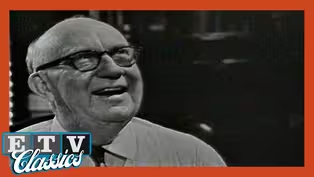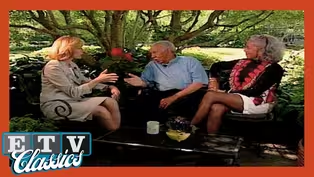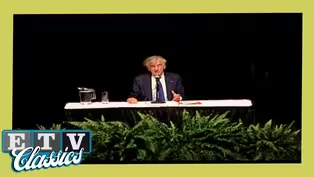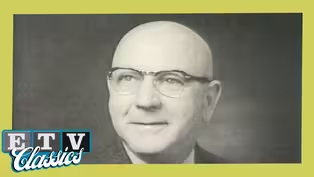ETV Classics
Open Line: Carolina to Shanxi (1980)
Season 15 Episode 24 | 28m 51sVideo has Closed Captions
An exchange program for higher education between USC and the people of China's Shanxi Province.
SCETV's Open Line takes us to Shanxi Province, China in 1980 with a 21-person delegation from the University of South Carolina. The purpose of the visit was to set up an exchange program for higher education between the University of South Carolina and Shanxi Province of the Peoples Republic of China.
Problems playing video? | Closed Captioning Feedback
Problems playing video? | Closed Captioning Feedback
ETV Classics is a local public television program presented by SCETV
Support for this program is provided by The ETV Endowment of South Carolina.
ETV Classics
Open Line: Carolina to Shanxi (1980)
Season 15 Episode 24 | 28m 51sVideo has Closed Captions
SCETV's Open Line takes us to Shanxi Province, China in 1980 with a 21-person delegation from the University of South Carolina. The purpose of the visit was to set up an exchange program for higher education between the University of South Carolina and Shanxi Province of the Peoples Republic of China.
Problems playing video? | Closed Captioning Feedback
How to Watch ETV Classics
ETV Classics is available to stream on pbs.org and the free PBS App, available on iPhone, Apple TV, Android TV, Android smartphones, Amazon Fire TV, Amazon Fire Tablet, Roku, Samsung Smart TV, and Vizio.
Providing Support for PBS.org
Learn Moreabout PBS online sponsorshipMore from This Collection
Find classic news and public affairs programming from South Carolina ETV.
Charleston Place | Carolina Journal (1986)
Video has Closed Captions
This edition of "Carolina Journal" revisits the opening of the Charleston Place complex. (27m 20s)
U.S.S. South Carolina | Carolina Journal (1984)
Video has Closed Captions
Michael Collins goes aboard the missile cruiser U.S.S. South Carolina as it visits its namesake. (28m 54s)
Strom Thurmond Remembered (2003)
Video has Closed Captions
Charles Bierbauer reviews the life and accomplishments of South Carolina Senator Strom Thurmond. (1h 51m 22s)
Strom Thurmond At The Seat of Power (1982)
Video has Closed Captions
The documentary follows the life and career of Strom Thurmond. (29m 49s)
Profile: The Senator from Barnwell: Edgar A. Brown (1967)
Video has Closed Captions
A visit with the venerable Edgar A. Brown in his law office, home, and the streets of his hometown. (14m 42s)
A Conversation with Justice Ernest Finney, Jr.: A Lifetime of Success (2000)
Video has Closed Captions
The honorable Judge Ernest A. Finney, Jr. discusses his life, career, and legacy in SC's lawfare. (27m 47s)
Profile: Senator John Drummond of Ninety-Six | The Big Picture (2008)
Video has Closed Captions
The life and times of Senator John Drummond of Greenwood, South Carolina. (26m 53s)
Video has Closed Captions
The memoirs of three businessmen who attribute their successes to their time in the US Marine Corps. (28m 54s)
The Governors' Roundtable | Carolina Journal (1989)
Video has Closed Captions
A round-table discussion with nine men who served as governor of the state of South Carolina. (57m 54s)
Elie Wiesel | Solomon Tenenbaum Lectureship in Jewish Studies (2006)
Video has Closed Captions
Professor Elie Wiesel, first Nobel laureate delivers a lecture as a part of the Tenenbaum series. (1h 17m 18s)
Solomon Blatt: Speaker Emeritus of the SC House | Carolina Journal (1985)
Video has Closed Captions
The life and career of Solomon Blatt, Speaker Emeritus of the S.C. House of Representatives. (27m 49s)
Remembering Bill Moyers: War in the Gulf - Town Meeting (1991)
Video has Closed Captions
Bill Moyers, who died June 26, 2025, was an award-winning journalist and PBS host. (59m 32s)
Providing Support for PBS.org
Learn Moreabout PBS online sponsorshipAnnouncer> The following program is made possible in part by a grant from the Corporation for Public Broadcasting and from the ETV Endowment of South Carolina.
♪ ♪ Tom Fowler> Recently, the University of South Carolina sent a 21-person delegation to establish an exchange relationship with higher education in Shanxi Province of the People's Republic of China.
Since the return of the University of South Carolina's delegation to China, people have asked time and again, "What is China like?"
That's a difficult question.
(car horn honking) For any South Carolinian who has been to this nation, such a brief visit is filled with impressions and contradictions.
(children singing) In this half hour, we will explore the mission of the University of South Carolina and get a unique look into the people and country that is China.
(children singing) (clapping and laughing) The 21 person delegation was headed by President James Holderman and University Board Chairman Mark Lee Dennis.
It included House Speaker Pro-tem Michael Daniel, three representatives of Governor Dick Riley, University faculty, staff, and students.
In addition to Allen Sharpe and I of South Carolina ETV.
President Holderman.
Pres.
Holderman> To the best of our knowledge, this is the first time that an American University has established a relationship with a provincial Chinese university.
Peking University, for example, is a national university in China, a relatively small university by American standards.
Several thousand students, four or five thousand students, I think.
Has relationships with some American universities that are more or less informal.
This is the first time that, to the best of our knowledge, as I've said, that an American university has established an official exchange relationship for students and scholars and information with a university of a province.
A province which itself is underdeveloped in a nation which is underdeveloped, but a province which has got a lot going for it because of the fact that the chairman of the party is from Shanxi Province, Chairman Hua.
And the ambassador to the United States, Ambassador Chai Zemin is from Shanxi Province.
And there are resources in Shanxi Province which need development.
And the people are 24 million strong, bigger than any state in the United States, are ready to move out.
So I think the potential for the University of South Carolina is virtually unlimited, as it is the principal funnel through which the interests of much of China and Shanxi Province flow.
And I think what we've done, Tom, is establish a model with the blessing of Peking, which is very important for other provincial universities to enter into relationships with other state universities here in the states, here in America.
I think because we were so closely... scrutinized, not in the sense of being shepherded, but in the sense of being monitored.
And again, not for qualification or constraint, but for finding out what our interests were so it could be replicated with other states and other provinces.
I think we are a first in the eyes of the Chinese, not just in Shanxi Province, but in the Chinese nation.
Well, this is probably the... the agreement that's attracted the most attention because of the visit of the delegation to China.
But the university has relationships with other universities in Europe and in Latin, and Central, South America and in Africa, which are ongoing.
And we exchange students and faculty.
We've had an Oxford Exchange of faculty for years around here.
We have a relationship with the University of Kent, the University of Bonn, University of Sao Paulo, University of Jos.
This is a relatively formal relationship that we have with Shanxi, but it's because of both of us were ready for it.
It is a, the agreement itself is not substantially different from that which we have with other institutions.
It has attracted attention, as I said, because of the delegation's visit, which made it unusual, and the signing of the agreement there in Taiyuan, in the Shanxi Province.
Underlining the importance of it to them.
As far as its impact on our international development as a university, I think it... substantial.
It focuses national attention, international attention once more on the University of South Carolina as being at the forefront of international development.
It calls for the exchange of 20 Chinese students and faculty to come here in the fall of '81 and ten students and scholars, academic rank, to go to China in the fall of '81.
Each for up to two years, but more optimally a year in the exchange experience.
And that specific scientific fields and English would be the areas of focus, particularly of those coming from China, here.
And Asian studies and cultural studies and language would be the principal emphasis of the people who go to China.
It also called for both universities to establish offices on economic matters.
And it also... identified, the need for informational exchanges between the two, for visiting professors and for cultural exchange.
♪ ♪ ♪ ♪ ♪ ♪ ♪ ♪ ♪ ♪ ♪ ♪ ♪ ♪ ♪ ♪ ♪ ♪ ♪ ♪ ♪ ♪ ♪ ♪ > One of the surprising things, to my uneducated mind, was the extent to which basketball has come to dominate, the Chinese as a major sport.
Every place we went, we found backboards and we found people playing basketball.
Our delegation was invited to play Shanxi University in a game.
And most of us very smugly thought that, this would be easy pickings.
And we even talked about ways in which we could hold down the score so as not to embarrass our guest.
I should have known we were in trouble when I watched young men and young women out in the playground, dribbling between their legs, practicing figure eight formations.
But when this game, was announced after our 21 course meal, we again... approached it as, from a position of overconfidence.
That overconfidence evaporated the minute we walked into the gym and found a standing room only crowd of at least four thousand, waiting in eager anticipation for our arrival.
The fans were extremely courteous.
They applauded our every achievement.
Unfortunately, they did not have much to applaud on our behalf.
The Chinese are very good at sports.
And we went down to a stunning defeat.
But it was a gesture in goodwill as well as an educational experience.
Coach> Hey guys, we gotta go back fast and get your hands up.
Block up the middle.
They're really... the right hand side.
Player> We're doing pretty good.
Coach> I know you're doing pretty well, but let's... less dribbling, a little bit more passing.
Short passes.
Get it up faster.
Okay?
(teammates talking) Short Passes.
(teammates talking) (applause) (players congratulating each other) Post game.
You want an explanation?
They were better.
We were worse.
Player> We didn't want to beat them.
Coach> We had to prove cooperation between our two universities.
(players talking together) ♪ Pres.
Holderman> I think Chinese ambitions are as high as the ambitions of any people in the world.
And I think... their candor and willingness to admit that the Cultural Revolution set them back, is exemplary and is going to save them over the long haul because they are willing to say education was destroyed.
The country was set back at least a decade, if not two.
And they are putting tremendous dependence upon education at all levels to bring them out of the... the slump, which was both cultural and economic, created by the Gang of Four and the Cultural Revolution, which lasted for ten years, '65, '66 to '75, '76.
And they are looking to their universities to provide the leadership by restoring standards, by restoring degree programs, by providing the intellect, the genius, the research capacity that it's going to take to allow China to catch up with the rest of the world.
> The effects of the Cultural Revolution were just disastrous.
Technology has been changing so rapidly that to miss a recent ten year segment, is just to be crippled immeasurably.
They're struggling to recover from it.
But if one didn't participate for ten years and doesn't have the recordings of what was going on in the library for the last ten years, it's an almost impossible job to get back to state of the art.
The students are a very, very select group.
They're very bright.
They're very highly motivated.
They're very clever.
I was much impressed with the things that they had done with what was often very crude instrumentation.
Yet they were able to show basic understanding of the phenomena and to use... what we would consider antiquated equipment to demonstrate and to study those phenomena.
The equipment itself, was in most cases, 30 years or more old.
The new equipment was just being unpacked or had just been installed.
They had not yet learned to utilize it fully, and in many cases the new equipment was, not... quite state of the art or not of adequate scale to do what they should be doing.
They... very eager to do something about it.
Their commitment is very high.
The students are... more than capable of absorbing things and absorbing them at a very, very high rate.
I'm very confident that any student who came here would be very strong in mathematics.
They would be very strong in basic science, such as physics.
Their weakness would be in the laboratory... aspects of the sciences.
> I was very impressed by the alertness and inquisitiveness and brightness of the Chinese students.
This group certainly is one which I feel should be, aided and assisted, in every possible way, to develop their educational opportunities, both for their benefit and for the benefit of the people whom they will serve in the future.
In other areas, we saw other types of equipment, again, antiquated compared to American, standards.
One area, however, was quite modern and up to date, and that was the electron microscopic laboratories, which were in a relatively new building of the medical school.
These were obviously of the latest, type and models, mostly Japanese equipment.
And the, professor who was in charge of this area was obviously very, very knowledgeable about his equipment and what he was doing.
So that despite the overall impression that the medical school is antiquated, both in terms of its buildings and equipment, there are apparently islands of excellence in the system.
> What, especially as an American, I guess, I get hit in the face with is an incomparable sense of history.
Despite the fact that almost everything one could currently read in China... would be, since 1949, and nothing really existed prior to that.
When you start looking at the sites in the country and start talking to the people and have them tell you about what you're looking at, be it... the Grotto or the Ming Caves, or be it the Great Wall or whatever, those centuries old things, obviously, to young, indoctrinated, trained communist kids still means a lot.
They take pride in it.
And you, coming from the outside, look at it, and one can easily believe where once the center of civilization was, extremely impressive.
> Of course, as everybody said, the first thing that we got early in that... after that, rather memorable, evening train ride was snow.
That was interesting.
Something I hadn't anticipated.
I'd been told that there was very little precipitation, in most of Shanxi during that particular month.
From then on, it was bewilderment and, mostly pleasant, the, Datong where we went.
The caves were- You can be told that there are impressive caves you can be described to- You can have someone describe the fact that there are carvings, and I've seen carvings.
I've been to caves before in northern India.
And yet once you're there, and you witness the majesty of religious expression, you don't have to share the religion.
You don't have to share any religion.
But you can certainly be I think, awe inspired by what... what took place, and... the artistic expression was just amazing.
The giant Buddhist statues, the tiny ones, all of them carved with detail and with attention, with zeal.
I don't care whether, the order is behind these carvings was political, as I know it was.
These were northern rulers who had conquered northern China.
They were not Chinese.
They wanted to spread Buddhism, in effect, to improve their own control over the countryside.
So sometimes it was religious inspiration on their part.
Sometimes it was political manipulation on their part.
But the carvers, no one could convince me, were anything but religiously inspired and... zealous in their artistic expression.
It was fantastic.
I had some fascinating discussions with the two girls there who were guides and, and I tried to be sort of, I tried... I hate to say this because I sound like a sycophant, but I tried to be ingratiating a little bit, and I said, "I'm sorry that these emperors ordered this, at great hardship to the people."
And their response was, "Well, if they hadn't, we wouldn't have these caves."
And I said, and "I'm sorry that the people suffered."
Obviously, people suffered in having these caves constructed and having these caves carved in.
And they said, "And it's true, we feel sorry for them too, but they've given a legacy to China and the rest of the world that we can all appreciate."
Which is a remarkable position for a socialist country, which invariably takes the position, at least in the early revolutionary stages of, art for society's sake.
Never art for art's sake, never art, obviously, for religious sake, for the sake of religion.
And here they were saying, "Well, this has given, this is created for us a fantastic cultural legacy."
We saw that the students at the universities desperate, both at Beijing University and Shanxi University, to talk to us and ask us not just questions like, what courses do you teach?
But, what- One student representative was asked about his sex life by a Chinese coed.
I think that's good.
That shows that they're interested in Americans.
They're interested in everything about Americans.
And... but the smaller kids were, again, so at ease with us.
They looked at us, we were strange.
But the minute we started saying, "hey, you know," and the minute there was a translator, at least with me with and talking them to the Chinese, there was no problem in getting an answer from them.
"What do you like?
What do you eat?
Do you play baseball or do you like basketball?"
The questions that we would ask our kids, the kind of Mr.
Knozit questions to small kids can be asked of the Chinese and they'll answer and respond.
Which again shows that there's not that much, that... all those years of that horrible ice curtain that existed between our two peoples, is melt... is potentially meltable very, very easily, especially among the small kids.
(children chatting and laughing) (children singing) ♪ (children singing) ♪ > But one of the things that made this particular trip and the delegation that participated in it, unique among the Americans who have gone to China, is that we were able to venture off the beaten path.
The Chinese, like every society, have certain cities, certain areas which they are proud to display and to expose.
We deviated from that pattern.
We saw things that have not been seen by American as yet.
And I think, when one wants to tap the true character of society, one has to go away from the spotlight and to look in some dark corners.
There, what was impressive was what we saw was not the diversity, but the commonality of the people.
If these were not showcases, as they most certainly were not, they were also not, there was also not present, gloom and doom, deprivation, that can be found in almost every society, including the world's most wealthiest societies.
> And there's always been a great relationship between the Chinese and the American people.
From '49, the Chinese call it the "liberation," on, until 1972, '73, when the process of discussion began and normalization in the mid '70s took place, there was something missing out of American life.
And I think based on our discussions with the Chinese, out of Chinese life.
We missed each other.
Now there's a tremendous resurgence of interest in China and an interest in developing ongoing dialog with people that, have been, as I said, missed a great deal over, almost three decades.
So there's a natural affinity to do something with the Chinese.
Secondly, and I think this is borne out by our visit there, there is a special role for education in China and a role which needs support as perceived by them and by us from American educational institutions.
The situation, which accompanied the Cultural Revolution brought about the virtual destruction of quality in Chinese education.
And they are the first to admit, now that ten years of disaster, which they referred to, brought Chinese education to its knees.
Eliminating admissions standards, degree programs, leveling this lowest common denominator was the principal objective of the Cultural Revolution, and the Gang of Four.
So they're looking now to American educational institutions to help them right that particular, shortcoming in Chinese society.
One of the interesting and refreshing things about the trip was we found the Chinese to be, openly candid about how backward the situation had become and how much ground they lost.
Probably two decades.
That they're going to really have to work like... ever to keep up and to catch up, with where they were.
So we can be of great help... to them.
And it's a tremendous, cultural enriching experience for American institutions to be involved with this venerable nation was a tremendous asset.
Its people are absolutely... beyond compare with anybody in the world, not only in number but in quality.
They are very bright, very curious, very dedicated people.
♪ ♪ ♪ ♪ ♪ (applause)
Support for PBS provided by:
ETV Classics is a local public television program presented by SCETV
Support for this program is provided by The ETV Endowment of South Carolina.

























